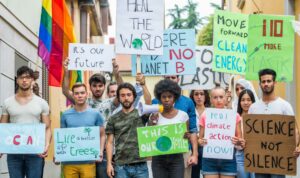Join a global conversation on best practices for teaching sustainability in business schools. Get inspired by new approaches and share your experience.
Around the world, business school educators are increasingly aiming to integrate more sustainability content into their teaching practices. This journey isn’t always easy — but many organizations help light the way.
On June 17, 2024, 9-11 ET, NBS will host “Navigating the Ecosystem of Support for Teaching Business Sustainability” (Virtual)
Leaders from international organizations supporting educators in this journey will present the resources and services offered by their organizations. Participants will gain a broader sense of the resources available and how to use them.
This session is a capstone event for the NBS Climate Teaching Series and is part of Responsible Management Education Week. Join us for a dynamic, interactive event! More details on the session and the full NBS Series are below.
About the NBS 2024 Climate Teaching Series
Do you want to integrate climate topics into business school education?
Whether you’re an experienced educator in this area or looking for inspiration to get started, these events are for you.
Monthly webinars began on January 25, 2024. Each one addresses a different climate theme – supporting you to educate students on one of the most important issues of our time. All interested business school faculty and staff are welcome.
Register now to receive calendar invites for each session and periodic series updates from NBS. Find recordings and resources from past sessions below.
Sessions cover everything from carbon management to climate policy. Each session includes:
- Short “success stories:” Faculty present specific curriculum materials or activities with learning objectives, student outcomes, and lessons learned
- Plenary Q&A
- Breakout conversations for participants to share their own approaches, question initial presenters, and discuss new ideas.
We encourage you to join in real-time to share your ideas, dive into the concepts, and build community. If you haven’t made it to the live sessions, you can explore outputs below.
Upcoming Sessions and Past Events
Below find information about each session planned to date. Click the links to find recordings and other outputs from past sessions, and review topics for future sessions.
Access Presentation Recordings and Materials
Jan 25: Hands-on Approaches to Teaching Carbon Management in Business
The session focuses on hands-on, experiential strategies for teaching students to measure and manage carbon footprints – on an individual and corporate level.
Watch the presentations from:
|
Presenter |
Material/Activity |
|
Fernanda Carreira, Head of Integrated Education, Center for Sustainability Studies, FGV EAESP, |
Celsius – the 2 Degree Challenge A game about companies’ GHG decisions and how to collaborate to stay below 2 degrees of warming. Used with undergraduate, graduate, and corporate audiences. Game length approx. 3 hours. |
|
Associate Professor, Department of Management, HEC Montreal, Canada |
Creating a Net Zero Plan for an Infrastructure Company A project where students craft and present solutions to a company on 4 net zero related problems: offsetting, legislation, scope 3 emissions, and company culture. Used in a graduate elective course. Project length = 4 weeks. |
|
Carine Sonntag, |
Climate Fresk & the 2 Tonnes Workshop Climate Fresk is an interactive workshop explaining climate basics. 2 Tonnes is a computer game with the goal of reducing everyone’s emissions to 2 tonnes by 2050, with individual and collective action components. Used with undergrad and Master’s audiences. |
Access Presentation Recordings and Materials
Feb 23: Fostering a “sustainability mindset” in students to enable climate action
How can business students see the world through a sustainability lens, considering sustainability issues in all their decision-making? This session explores strategies for cultivating such a mindset.
Watch the presentations from:
|
Presenter |
Material/Activity |
|
Emmanuelle Reuter, Assistant Professor Quynh Dao, PhD Candidate University of Neuchâtel, Switzerland |
Sustainability Mindset Indicator An assessment taken before and after sustainability teaching interventions to understand their impact (on concepts including paradoxical thinking, circular economy, systems thinking).
|
|
Sylvia Perez, Professor, CETYS Universidad, Mexico |
Zero Waste at Home A semester-long activity where students examine the impact of the waste they produce at home. As part of this activity, they learn the 5 Rs, design their home recycling area, and participate in recycling campaigns at the institution. |
|
Tom Bateman, Bank of America Eminent Scholar of Commerce, Emeritus, University of Virginia McIntire School of Commerce, USA |
Climate Psychology and Leadership A lecture which provides an overview of prominent psychology and social psychology subtopics that can contribute to (mis)managing climate change: attitudes and behaviors, decision biases, and leadership. |
Access Presentation Recordings and Materials
March 19: Teaching Climate Policy and Negotiations in Business Schools
Government policy is inescapable in climate action. Companies – and students – need to understand their role in the policy process. This session examines how to bring policy into the business classroom. Presentations include a multi-stakeholder negotiation exercise, and the Climate Interactive ENROADs simulator.
| Presenter | Material/Activity |
| Sathyanarayanan Ramachandran, Associate Professor of Marketing, IFMR Graduate School of Business, Krea University, India |
ENROADS Simulation in Purpose and Permanence canvas MBA Students participate in the ENROADS simulation at beginning of the Product and Brand Management course. ENROADS is an acclaimed workshop based on Climate Interactive and MIT Sustainability Initiative’s digital simulator. Before the workshop, sensitization sessions on sustainability and business is handled with a focus on Gandhian ideas on ecology, and the Deep Purpose continuum. In the workshop, students gain first-hand experience of proposing climate solutions and seeing the impact on global temperatures. This embeds climate awareness in marketing decision making throughout the rest of the course. |
|
Bettina Wittneben, Associate Fellow in Management, Pembroke College, University of Oxford, UK; Principal, AFRY Management Consulting
|
Model UNFCCC Through three workshops culminating in an interactive exercise, MBA students simulate the UNFCCC negotiations. They learn about the challenges of generating international consensus on climate action and reflect on the role of different societal actors in climate action. |
April 25, 9AM ET: Climate Literacy Training and How to Use It
The Climate Literacy Training for Educators, Communities, Organizations and Students (CLT-ECOS) is a widely used training that helps educators understand climate fundamentals, including high impact climate solutions.
In this session, CLT-ECOS leader Dr Petra Molthan-Hill provides an overview on CLT. She is joined by multiple educators who will briefly share the diverse ways that they’ve used the CLT to inform their teaching, educate other faculty, or connect with practitioners.
We’ll see how the training is – and can be – repurposed in different geographies and sectors worldwide. The session will also include time for Q&A and breakout discussion. Join to discuss how to use the Climate Literacy Training – or elements of it – in your own work.
More about CLT-ECOS: This initiative has engaged over 15,000 academics, educators and other university staff in 72 countries to embed climate solutions in their teaching, research and other work. It has been delivered worldwide since 2019.
June 17, 9-11AM ET: Navigating the Ecosystem of Support for Teaching Business Sustainability
Around the world, business school educators are increasingly aiming to integrate more sustainability content into their teaching practices. This journey isn’t always easy — but many organizations help light the way.
In this session, hosted as part of Responsible Management Education Week, leaders from international organizations which support educators in this journey will present the resources and services their organizations offer. Participants will gain a broader sense of the resources available and how to use them.
Following the presentations, participants will rotate through breakout rooms for Q&A sessions with each organization’s representative (a “World Café” model). Participants can ask questions about the organizations, and organization leaders can ask for input or feedback on offerings.
Finally, the session will end with a panel where organization leaders take a wider view of the ecosystem, considering questions like: “How do these organizations fit together?” “Might there be collaboration or synergy?” “What can we learn (or have we learned already) from one another?” etc. We hope this panel will be informative for general attendees and spark new thinking or future collaborations among the organizations represented.
A Guide to the Climate Teaching Landscape
In developing this series, the Network for Business Sustainability has worked in partnership with other organizations supporting climate teaching in business schools. We encourage you to explore their resources and initiatives:
- AACSB Societal Impact work
- Business Schools for Climate Leadership; Business Schools for Climate Leadership Africa
- Carbon Literacy Project
- ClimateCAP
- Financial Times, including this year’s teaching award winners
- GRONEN
- Open Climate Curriculum (from Columbia University Business and Climate Initiative)
- Organizations and the Natural Environment (ONE) Teaching
- Sustainability in Academia
- UN PRME, Climate Literacy Training
We also thank our advisors for their specific input:
Fernanda Carreira, FGV EAESP; Valentina De Marchi, ESADE Business School and GRONEN; Jill Bogie, Gordon Institute of Business Science and BS4CL Africa; Katie Kross and Jessica Wingert, Duke University and ClimateCAP; Marina Schmitz, IEDC-Bled School of Management; Divya Singhal, Goa Institute of Management and ONE Teaching Team; Mike Toffel and Lynn Schenk, Harvard University; Bruce Usher and Sandra Navalli, Columbia University and Climate Curriculum Initiative
Why NBS Developed this Teaching Series
Business schools and business faculty want to respond to the climate crisis. NBS wants to help them do so. These events on teaching climate are intended to address the needs of instructors while complementing existing efforts in this space.
These events bring together educators who have created and integrated effective approaches to teaching climate in business schools with educators at earlier stages. It enables sharing of materials, guidance, and best practices that will advance climate teaching for all.
How we developed the series: NBS staff consulted with experts in the climate teaching space on what framing and structure would be most useful. We issued an open call for submissions, shared widely. We developed the themed sessions based on our initial framing and presentations submitted.
More info: Contact Abby Litchfield at info@nbs.net.





Add a Comment
This site uses User Verification plugin to reduce spam. See how your comment data is processed.This site uses User Verification plugin to reduce spam. See how your comment data is processed.